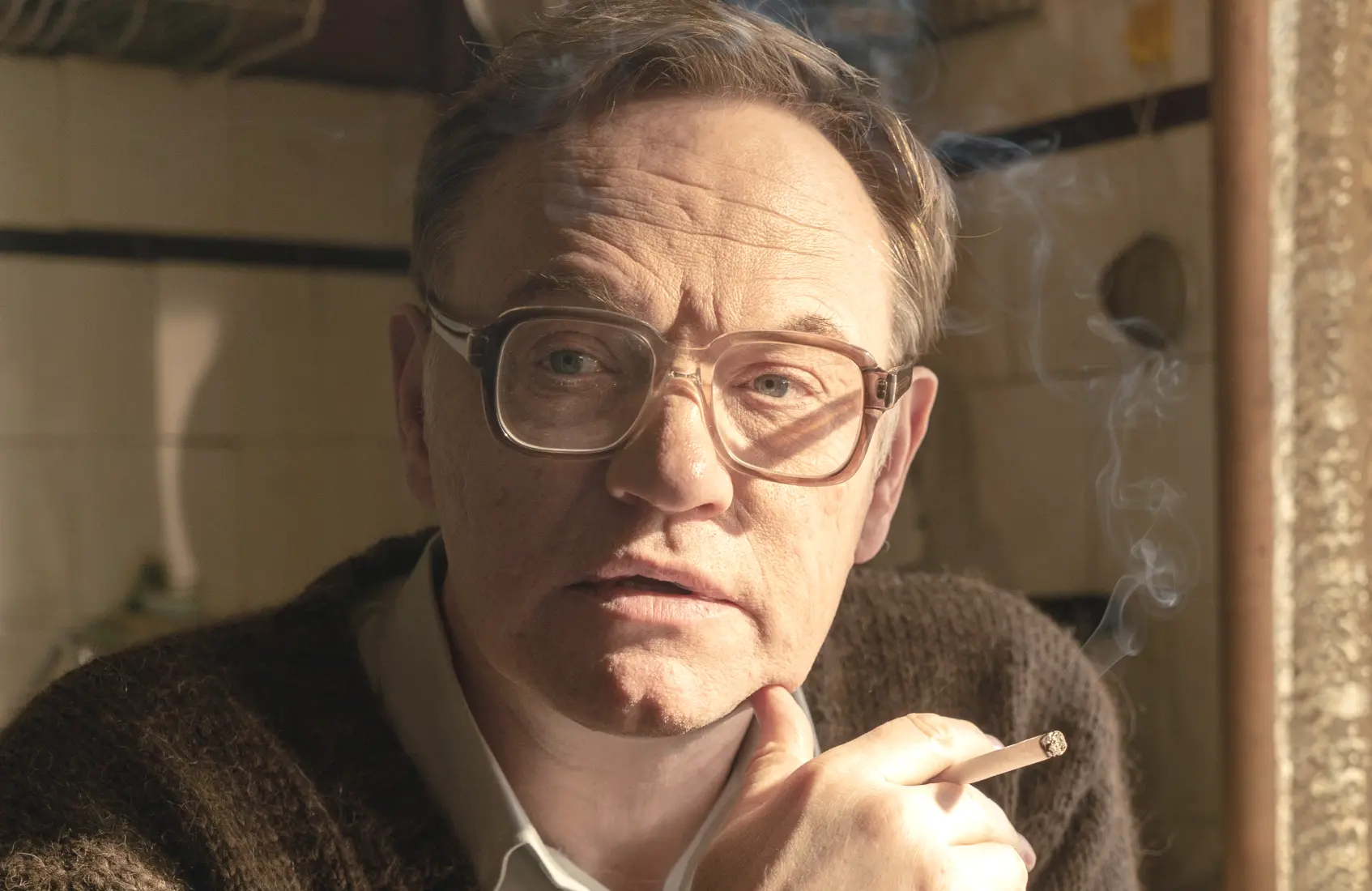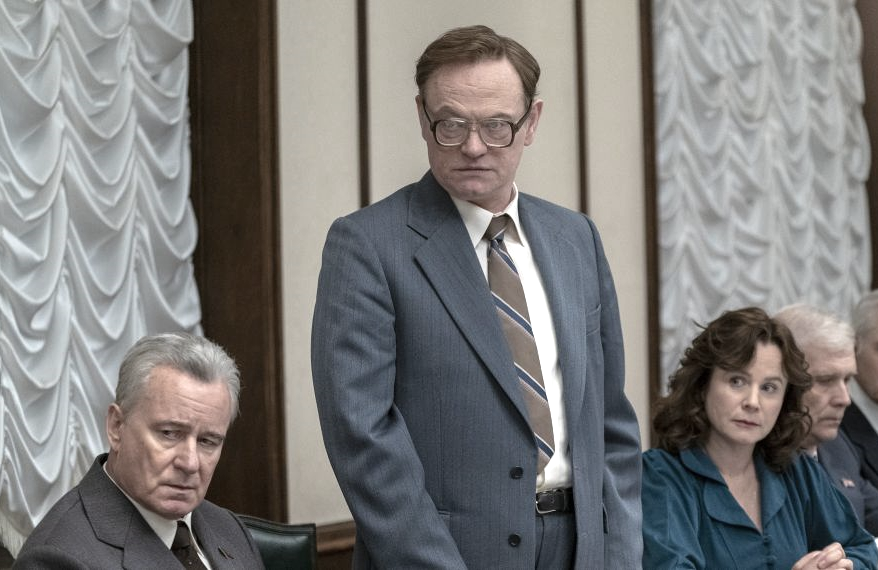An Appreciation of Jared Harris as Chernobyl's Tragic Hero
-
 Jared Harris in Chernobyl (HBO)
Jared Harris in Chernobyl (HBO)Jared Harris dies a lot on screen. It hasn’t quite hit Sean Bean levels, but if a part requires someone to deftly walk the line between noble and tragic, whether it is a king, captain, financial officer or scientist: Harris is your guy.
The life expectancy of a character on the five-part miniseries Chernobyl (which concludes Monday night on HBO) is unsurprisingly short, but this isn’t the reason why Harris is perfect in the role of nuclear physicist Valery Legasov. Detailing the night of the world’s worst nuclear disaster and the subsequent clean-up (and attempted cover-up) operation, Legasov serves as Chernobyl's moral thread, as a patriotic duty becomes at odds with the scientific investigation into how the unthinkable happened. An Orwellian nightmare come to life, instead of being told two plus two equals five, characters dispute the presence of radioactive material despite expert testimony. “It’s not alarmist if it’s a fact,” Legasov states in his first meeting with the Central Committee, defying protocol by voicing a dissenting opinion. When he slams his hand down on the table it could put his life at risk before he has even got to Pripyat. The Soviet misinformation cycle has to be broken in order to stop this from happening again, but it isn’t a case of simply presenting evidence to support a claim.
Legasov's fate is revealed in the opening sequence of the first episode, which takes place two years after the disaster. A tape recording doubles as exposition and a suicide note, detailing the power of repeated lying and denial of facts that is the very foundation of Chernobyl. Before we have even witnessed the horrific scenes at the nuclear reactor, the man who will be our guide hangs himself.
Showrunner Craig Mazin’s meticulous attention to Soviet-period detail has been praised, and the accompanying podcast (featuring Mazin) reveals just how much consideration was taken in recreating these events and characters. But this isn’t just about getting the minutia right. Striking a personal connection to characters twho won’t survive beyond Episode 2 can be a challenge, which is why having someone like Harris in this lead role is vital. He spews out plenty of jargon, which is dumbed down when Soviet politician Boris Shcherbina (Stellan Skarsgård) asks for a basic breakdown of how a nuclear reactor works. Legasov’s crash course has convinced me that I could pass Nuclear Physics 101. In the following episode, “Open Wide, O Earth,” the science lesson details the effects of radiation sickness and it ain’t pretty. “The arteries and veins spill open like sieves,” is a truly horrifying image, but it also sounds like poetry when Harris speaks this line.
Dread oscillates between a low hum and “I want to throw up” levels, with a number of intense hold-your-breath sequences per episode. As resident expert, Legasov spends much of his screentime with a clenched jaw, chain-smoking his way through each difficult decision made in an attempt to solve this crisis. Early on, he lies to a couple in a bar, telling them that everything is fine, even if his face betrays the words he speaks. Chernobyl is equal parts wordless horror and dialogue heavy, with Legasov partaking in both. To understand the mechanics of not only the disaster but also the Soviet political apparatus it requires large swaths of exposition. Legasov is our world-weary professor, while Boris is the Party Man who knows when to talk and when to hold back (someone is always watching or listening). Together they make an for the unlikeliest of partners; Harris is the heart, Skarsgård is the head and they share a mutual respect that flourishes into friendship. Throw in scientist Ulana Khomyuk (Emily Watson) as the conscience refusing to bend to the Soviet will, and all bases are covered.
The Central Committee is not interested in any truth that will make them look weak as a nation. But to the men doing the dangerous work, whether it is the miners who are digging beneath the reactor or the volunteers required to dive in the flooded basement to stop another catastrophe, willful manipulation is quickly ruled out in favor of blunt honesty. Legasov is tasked with coming up with a solution including finding the people to do it. In “The Happiness of All Mankind,” after mechanical robots have failed to clean up the graphite on the roof, he suggests “biorobots.” The Soviets didn’t have Westworld-like technology, this is just a double-speak way of saying a human being. Not that Legasov is saying this in a blasé fashion, he still looks like he can’t quite believe he has to ask more people to sacrifice themselves. But as a scientist, he has to find the best solution and this is it. He is not a bureaucrat sitting behind the safety of his desk thousands of miles away, and he knows his own life expectancy has been dramatically reduced.

A lot of the standout moments are wordless reactions to the horrorshow unfolding before their eyes. Behind his oversized thick rim glasses, Legasov’s face speaks a thousand words as he reads the initial report about the incident, switching from mundane contemplation to a realization that the worst case scenario has come to life. His slack-jaw expression at the naked miners isn’t because he is uncomfortable with their nudity, but because he has put these men in this incredibly dangerous situation, potentially for nothing. And it is hard for him to hide a look of pure revulsion at the apparatus they are working for when Boris reveals he can’t guarantee these men will be looked after in the long-term.
This far from Harris’ first time playing a character trying to act nobly when all is stacked against him. As Lane Pryce in Mad Men, pride got in his way as he experienced financial issues, which ultimately led to his firing from the firm. In this dismissal scene with Don (Jon Hamm), he switches from a humiliating plea to anger, back to resignation. He is full of bitterness and rage when Don suggests they figure out an “elegant exit” for him. Lies and a power struggle underscore this moment, which ultimately leads to Lane hanging himself in his office — Harris pointed out the character parallels when he appeared on Late Night with Seth Meyers recently.
His part in The Crown is much smaller, but its impact is large, making me long for a prequel or a version of The King’s Speech with Harris as the lead (sorry, Colin). The lie being told in the first episode is a collective denial that the King is dying — as with Legasov, he smokes his way through the excessive coughing. Again, this is a role steeped in duty that doesn’t allow room for personal feeling. Breaking with the stiff upper lip image, King George has a moment of sorrow as carol singers perform. Wearing a homemade crown atop his head, his eyes brim with tears as the reality of his situation shifts into focus. It is not as globally impactful as staring nuclear disaster in the face, but the way Harris approaches this personal adversity turns a figurehead into a human being. For all the awards bestowed on The Crown, it is a shame Harris was left out of the conversation. It will be hard for Emmy voters to ignore Harris this year, in a performance that showcases why he is the man to turn to when all seems lost.
People are talking about Chernobyl in our forums. Join the conversation.
Emma Fraser has wanted to write about TV since she first watched My So-Called Life in the mid-90s, finally getting her wish over a decade later. Follow her on Twitter at @frazbelina.
TOPICS: Chernobyl, HBO, Jared Harris
- The "Evil Russian" stereotype has persisted on shows like Devs, despite "humanizing" Russian portrayals on The Americans and Chernobyl
- Republican Congressman Dan Crenshaw: Liberals don't like nuclear energy "because they watch The Simpsons or Chernobyl"
- How TV show companion podcasts became all the rage
- Chernobyl star Paul Ritter dies at 54